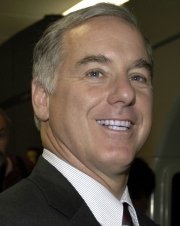 The Future Of Public Education
The Future Of Public Education
By Howard Dean
November 16, 2004
Tuesday
Thirty-five years ago I spent three months as a student teacher
at a middle school in New Haven, Conn. I learned many valuable
lessons, including that teaching is very rewarding and much more
challenging than most people think. I believe with adequate community
support that public education is still the best way to a better
future.
Unfortunately, President Bush's
"No Child Left Behind" approach is not leading us to
that better future. This program has generally failed since it
is essentially an unfunded mandate that has raised property taxes
and made it more difficult for really good teachers to teach.
And, the charter school movement suffered a blow when the U.S.
Department of Education's own statistics showed that children
in charter schools generally lagged behind their public school
peers by six months.
Based on nearly twelve years
as governor and fourteen years as a parent of two public school
students, let me recommend the following:
- Equalize education funding
so that every child has the same amount of funding no matter
if they are in an inner city, suburban or a rural school. Many
courts throughout the country have already called for this, and
in Vermont we did it.
- Allow more parental input
and responsibility. Parents should be able to choose among public
schools in their area by lottery. Magnet schools and public charter
schools should be encouraged only with real supervision. Home-schooled
children should be welcomed into public schools for activities
unavailable to them at home - after all, their parents pay taxes
to support public education. And, parents ought to be allowed
to request teachers.
- Teachers ought to be paid
a lot more and they ought to be rewarded for acquiring additional
expertise. This is already happening in some states; let's make
it happen in every state.
- Good school climate is everything,
which means leadership matters. The burnout rate for principals
is enormous. They are expected to be at meetings five nights
a week, leaving no time for their own families. Many are promoted
from within the ranks of the best teachers, and discover they
miss student interaction in the classroom. There should be limits
on extracurricular hours, and where it's necessary, principals
need an administrator to deal with paperwork, so the principal
can deal with kids and parents.
- Additional education opportunities
should be available. Vocational education should include adults
who are retraining. Community college courses ought to be available
in high schools for students who want an academic and financial
leg up.
- We ought to recognize that
many of the problems in public education have little to do with
what goes on in schools. If you want to help fix public education,
invest in children and their families at a young age. We need
to invest in children from birth to three years old. Preschools
should be available to every child. We did it in Vermont, and
our child abuse rate dropped by 43 percent for kids under six.
If you think all these recommendations
are expensive, think about what you are paying for the war in
Iraq. Think about the bill for prisons. Think about your property
taxes that have increased because you are paying for services
that are federal unfunded mandates.
Many of these recommendations
have been put in place in some states. Real education reform
means funding them, not empty slogans like "No Child Left
Behind."
 Email Howard Dean at
Email Howard Dean at
howarddean@democracyforamerica.com
Howard Dean, M.D. and former
governor of Vermont, is the founder of Democracy
for America, a grassroots organization that supports socially
progressive and fiscally responsible political candidates.
Copyright 2004 Howard
Dean,
All Rights Reserved.
Distributed exclusively by Cagle, Inc. www.caglecartoons.com
to subscribers for publication.
Post a Comment
View Comments
Submit
an Opinion - Letter
Sitnews
Stories In The News
Ketchikan, Alaska
|

